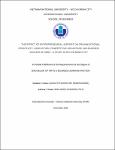| dc.description.abstract | The priority in this age is a greater focus on the contribution of small and medium-sized
firms (SMEs) to economic growth, not just in Vietnam but also globally. In the context of the
effects of economic integration, this article seeks to examine the contribution of management
factors to the performance of SMEs in the 8 main sectors including Information Technology,
Transportation, Agriculture, Forestry, Fishing, and Mining, Real Estate Activities, Retail and
Distributive Trade, Service Activities/Tourism, and Manufacturing in HCMC, Vietnam. In
this regard, the Vietnamese government views the development of SMEs as being essential to
the economy's stability, the creation of jobs, and the reduction of poverty.
Recent research demonstrates that while SMEs in Vietnam consistently demonstrate
innovation, these innovations are nonetheless constrained in terms of size, scope, and
orientation. Innovations, in particular, are primarily about cost savings and making minor
adjustments to current products in order to reach lower market segments (OECD, 2021). This
can be a result of Vietnam's SMEs' limited financial resources and the government's
underfunding of corporate innovation (OECD, 2021). In light of worldwide integration and
demand from numerous stakeholders to promote sustainable development, this has an impact
on the competitiveness of SMEs. In order to thrive and be successful, SMEs owners and
managers should seek for entrepreneur support, adopt creativity and innovation practices to
create competitive advantage. Moreover, this research also suggests that governments and
policy makers should focus more on supporting SMEs. The current study has fundamental
aims to investigate the current context of SMEs in Vietnam. First of all, the study tried to
construct the frameworks emanated from other studies and theories. Next, the proposed
framework contemplate the SMEs’ weaknesses in Vietnam. A survey method was conducted
for the data collection. The main data analysis was interpreted using the partial least squares
(PLS) technique. Then, it attempts to specify the key determinants and their effect on business
success. As the results suggest, all the four factors represent Entrepreneur Support,
Organizational Creativity, Firm Innovativeness, Organizational Competitive Advantage, and
Business Success. The results confirm the approval for 8 out of 10 hypotheses and unveil the
key findings on what factors should be invested by SMEs owners/managers. This research
sheds light on critical contribution for the research field of entrepreneur support as well as
provides important recommendations for strategic management. | en_US |


